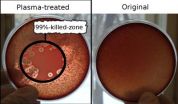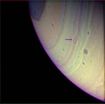(Press-News.org) Cold plasma jets could be a safe, effective alternative to antibiotics to treat multi-drug resistant infections, says a study published this week in the January issue of the Journal of Medical Microbiology.
The team of Russian and German researchers showed that a ten-minute treatment with low-temperature plasma was not only able to kill drug-resistant bacteria causing wound infections in rats but also increased the rate of wound healing. The findings suggest that cold plasmas might be a promising method to treat chronic wound infections where other approaches fail.
The team from the Gamaleya Institute of Epidemiology and Microbiology in Moscow tested a low-temperature plasma torch against bacterial species including Pseudomonas aeruginosa and Staphylococcus aureus. These species are common culprits of chronic wound infections and are able to resist the action of antibiotics because they can grow together in protective layers called biofilms. The scientists showed not only that plasma was lethal to up to 99% of bacteria in laboratory-grown biofilms after five minutes, but also that plasma killed about 90 % of the bacteria (on average) infecting skin wounds in rats after ten minutes.
Plasmas are known as the fourth state of matter after solids, liquids and gases and are formed when high-energy processes strip atoms of their electrons to produce ionized gas flows at high temperature. They have an increasing number of technical and medical applications and hot plasmas are already used to disinfect surgical instruments.
Dr Svetlana Ermolaeva who conducted the research explained that the recent development of cold plasmas with temperatures of 35-40°C makes the technology an attractive option for treating infections. "Cold plasmas are able to kill bacteria by damaging microbial DNA and surface structures without being harmful to human tissues. Importantly we have shown that plasma is able to kill bacteria growing in biofilms in wounds, although thicker biofilms show some resistance to treatment."
Plasma technology could eventually represent a better alternative to antibiotics, according to Dr Ermolaeva. "Our work demonstrates that plasma is effective against pathogenic bacteria with multiple-antibiotic resistance - not just in Petri dishes but in actual infected wounds," she said. "Another huge advantage to plasma therapy is that it is non-specific, meaning it is much harder for bacteria to develop resistance. It's a method that is contact free, painless and does not contribute to chemical contamination of the environment."
INFORMATION:
Plasma therapy: An alternative to antibiotics?
2010-12-16
ELSE PRESS RELEASES FROM THIS DATE:
MDMA: Empathogen or love potion?
2010-12-16
15 December 2010, MDMA or 'ecstasy' increases feelings of empathy and social connection. These 'empathogenic' effects suggest that MDMA might be useful to enhance the psychotherapy of people who struggle to feel connected to others, as may occur in association with autism, schizophrenia, or antisocial personality disorder.
However, these effects have been difficult to measure objectively, and there has been limited research in humans. Now, University of Chicago researchers, funded by the National Institute on Drug Abuse, are reporting their new findings in healthy volunteers ...
Sticking to dietary recommendations would save 33,000 lives a year in the UK
2010-12-16
If everyone in the UK ate their "five a day," and cut their dietary salt and unhealthy fat intake to recommended levels, 33,000 deaths could be prevented or delayed every year, reveals research published online in the Journal of Epidemiology and Community Health.
Eating five portions of fruit and vegetables a day accounts for almost half of these saved lives, the study shows. Recommended salt and fat intakes would need to be drastically reduced to achieve similar health benefits, say the authors.
The researchers base their findings on national data for the years 2005 ...
Doctors on Facebook risk compromising doctor-patient relationship
2010-12-16
Doctors with a profile on the social networking site Facebook may be compromising the doctor-patient relationship, because they don't deploy sufficient privacy settings, indicates research published online in the Journal of Medical Ethics.
The authors base their findings on a survey of the Facebook activities of 405 postgraduate trainee doctors (residents and fellows) at Rouen University Hospital in France. Half those sent the questionnaire returned it.
Almost three out of four respondents (73%) said they had a Facebook profile, with eight out of 10 saying they had ...
Study classifies and uses artificial proteins to analyze protein-protein interfaces
2010-12-16
Interactions between proteins are at the heart of cellular processes, and those interactions depend on the interfaces where the direct physical contact occurs. A new study published this week suggests that there may be roughly a thousand structurally-distinct protein-protein interfaces – and that their structures depend largely on the simple physics of the proteins.
Believed to be the first systematic study of the nature of the protein-protein interfaces, the research could help explain the phenomena of "promiscuous" proteins that bind to many other proteins. The results ...
p53 determines organ size
2010-12-16
In studies conducted on the fruit fly, researchers at IRB Barcelona headed by ICREA Professor Marco Milán have revealed that organs have the molecular mechanisms to control their proportions. In this process the protein p53 plays a crucial role. The study is published today in the prestigious journal PLoS Biology.
The correct establishment of organ proportions, which occurs during embryonic development, is vital for the proper function of all organisms. Alterations in the mechanisms responsible for these processes cause fatal errors in embryos and even cause their death. ...
Hospice care increasing for nursing home patients with dementia
2010-12-16
PROVIDENCE, R.I. [Brown University] — A new study of nursing home records shows more residents with dementia are seeking a hospice benefit and using it longer. The study also estimates that 40 percent of nursing home residents die with some degree of dementia. Researchers hope the new data will help policymakers preserve the hospice benefit even as they seek to control Medicare costs.
In newly published research analyzing data on more than 3.8 million deceased nursing home residents, researchers at Brown University and Hebrew SeniorLife/Deaconess Medical Center in Boston ...
Cyclone lasting more than 5 years is detected on Saturn
2010-12-16
Researchers from the University of the Basque Country (UPV/EHU) have been monitoring a cyclone on Saturn for more than five years. This makes it the longest-lasting cyclone detected to date on any of the giant planets of the Solar System. Images from the Cassini probe were used to carry out this study.
"Cyclones – where the wind turns in the same direction as the planet – do not usually last for a long time, and so we were interested to discover one that had gone on for several years on Saturn", Teresa del Río-Gaztelurrutia, lead author of the study and a researcher at ...
Fabric softener sheets repel gnats
2010-12-16
MANHATTAN, KS – For years, gardeners have claimed that putting Bounce® fabric softener sheets in their pockets is an effective way to repel pests like mosquitoes and gnats. Any Internet search will uncover countless articles about the bug-repelling properties of Bounce®. Are these claims valid or simply folklore? The authors of a new study say that until now, no quantitative data has existed to substantiate these claims, but their latest research has revealed a definitive answer: Bounce® sheets do indeed repel adult gnats.
In a report just published in HortScience, Kansas ...
Put on the brakes after foot or ankle surgery
2010-12-16
Patients recovering from a right foot injury or surgery should think twice about how soon they want to begin driving again. According to a new study from the Journal of Bone and Joint Surgery (JBJS), it takes much longer to brake when the driver is wearing an immobilization device - like a splint or brace, than it does when wearing normal footwear.
Driving is important to many people's social and professional lives, so when a person's right ankle or foot must be immobilized after an injury or surgery, one of the first questions an orthopaedic surgeon hears is, "When can ...
Marinomed's iota-carrageenan effective against H1N1
2010-12-16
Carrageenan, is a polymer derived from red seaweed which helps to create a protective physical barrier in the nasal cavity and has proven to be an effective antiviral in the treatment of the common cold. The present study assessed the efficacy of Carrageenan against influenza viruses, including the pandemic H1N1 influenza strain. Results showed that the polymer directly binds to influenza viruses, effectively blocking the virus from attaching to cells and spreading further. In animal experiments, Carrageenan demonstrated equivalent efficacy when compared to the drug Tamiflu. ...


